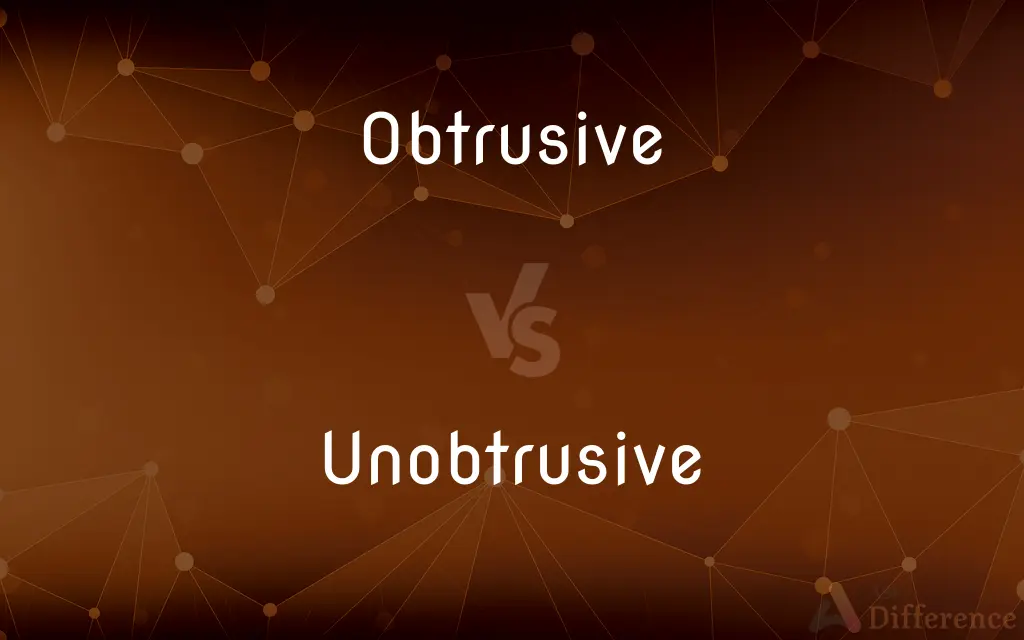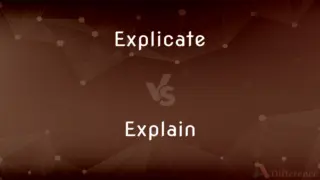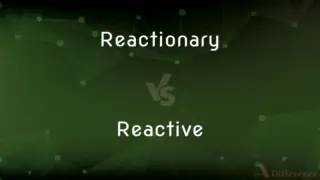Obtrusive vs. Unobtrusive — What's the Difference?
By Tayyaba Rehman — Updated on September 24, 2023
"Obtrusive" refers to something noticeable in an intrusive or unwelcome manner, while "Unobtrusive" describes something discreet or not drawing unwanted attention.

Difference Between Obtrusive and Unobtrusive
Table of Contents
ADVERTISEMENT
Key Differences
Obtrusive" and "Unobtrusive" function as opposites in terms of their implications about prominence and presence. "Obtrusive" conveys that something is imposing, often in an unwelcome way. An obtrusive advertisement, for instance, might interfere with a user's experience on a website. Conversely, "Unobtrusive" describes elements that blend in or are subtle, not causing disruption. An unobtrusive design, for example, would seamlessly integrate without drawing unnecessary attention.
While "Obtrusive" carries a mostly negative connotation, suggesting something is more conspicuous than it should be, "Unobtrusive" often has a positive or neutral tone. An obtrusive person might interrupt conversations frequently, while an unobtrusive individual might be characterized by their ability to listen more than they speak.
When discussing physical objects, "Obtrusive" might refer to items that stand out and perhaps clash with their surroundings. For example, an obtrusive building might disrupt the architectural harmony of a street. In contrast, an unobtrusive piece of furniture would fit comfortably within a room's décor, not drawing undue attention to itself.
In summary, while "Obtrusive" emphasizes undue prominence or interference, "Unobtrusive" highlights subtlety and a harmonious presence that doesn't disturb or disrupt.
Comparison Chart
Primary Meaning
Noticeable in an intrusive or unwelcome manner.
Discreet or not drawing unwanted attention.
ADVERTISEMENT
Connotation
Generally negative.
Generally neutral or positive.
Grammatical Role
Typically used as an adjective.
Typically used as an adjective.
In Context of People
Refers to those who impose or interrupt.
Refers to those who are subtle or don't disturb.
In Context of Objects
Describes items that stand out, often undesirably.
Describes items that blend in or are harmoniously integrated into their setting
Compare with Definitions
Obtrusive
Projecting outwardly; protruding.
The obtrusive branch blocked the pathway.
Unobtrusive
Not drawing undue attention; subtle.
The unobtrusive design blended perfectly with the room.
Obtrusive
Noticeably imposing or interrupting.
The obtrusive notifications disturbed my workflow.
Unobtrusive
Discreetly present.
The unobtrusive microphone didn't distract the audience.
Obtrusive
Attracting undue attention.
The obtrusive colors of the artwork clashed with the room's theme.
Unobtrusive
Modest and not showy.
The unobtrusive jewelry was elegant in its simplicity.
Obtrusive
Evident in a blatant or undesired manner.
His obtrusive behavior at the party was off-putting.
Unobtrusive
Not imposing or interrupting.
Her unobtrusive manner made her a pleasant coworker.
Obtrusive
Standing out undesirably.
The obtrusive stain on the shirt caught everyone's attention.
Unobtrusive
Harmoniously integrated into the surroundings.
The unobtrusive architecture complemented the landscape.
Obtrusive
Thrusting out; protruding
An obtrusive rock formation.
Unobtrusive
Not undesirably noticeable or blatant; inconspicuous.
Obtrusive
Tending to push self-assertively forward; brash
A spoiled child's obtrusive behavior.
Unobtrusive
Not obtrusive; not blatant or noticeable; discreet, inconspicuous.
Obtrusive
Undesirably noticeable
An obtrusive scar.
Unobtrusive
Not obtrusive; not presuming; modest.
Obtrusive
Sticking out; protruding.
The facade of the building was ornamented with obtrusive sculpted designs.
Unobtrusive
Not obtrusive or undesirably noticeable;
A quiet, unobtrusive life of self-denial
Obtrusive
Noticeable; prominent, especially in a displeasing way.
He has an obtrusive forehead.
Obtrusive
Pushy.
The office manager is an unpleasantly obtrusive individual.
Obtrusive
Disposed to obtrude; inclined to intrude or thrust one's self or one's opinions upon others, or to enter uninvited; forward; pushing; intrusive.
Not obvious, not obtrusive, but retired.
Obtrusive
Undesirably noticeable;
The obtrusive behavior of a spoiled child
Equally obtrusive was the graffiti
Obtrusive
Sticking out; protruding
Common Curiosities
Does "Obtrusive" always have a negative connotation?
Mostly, yes. "Obtrusive" often suggests something is more prominent or interfering than desired.
Can a design be described as "Unobtrusive"?
Yes, unobtrusive design is often subtle, harmonious, and doesn't distract.
Is "Obtrusive" always about physical presence?
No, it can refer to anything prominent, from behaviors to digital elements.
What's an antonym for "Obtrusive"?
"Unobtrusive" is a direct antonym for "Obtrusive."
Can "Unobtrusive" refer to a person's behavior?
Yes, someone described as "Unobtrusive" might be reserved or subtle in their actions.
How does "Obtrusive" differ from "Invasive"?
Both imply intrusion, but "Obtrusive" emphasizes noticeable imposition, while "Invasive" suggests encroachment or spread.
Can architecture be described using "Obtrusive" and "Unobtrusive"?
Absolutely. "Obtrusive" might describe a building that disrupts its setting, while "Unobtrusive" might describe one that complements its surroundings.
Can an idea or concept be "Unobtrusive"?
In metaphorical contexts, yes. An "Unobtrusive" idea might be one that's understated or subtly presented.
Does "Unobtrusive" mean invisible?
Not necessarily. It means not drawing undue attention, but it doesn't mean completely unseen.
Are "Obtrusive" and "Overt" synonymous?
Not entirely. While both can mean noticeable, "Obtrusive" has a more negative connotation, suggesting unwanted prominence.
Share Your Discovery

Previous Comparison
Explicate vs. Explain
Next Comparison
Reactionary vs. ReactiveAuthor Spotlight
Written by
Tayyaba RehmanTayyaba Rehman is a distinguished writer, currently serving as a primary contributor to askdifference.com. As a researcher in semantics and etymology, Tayyaba's passion for the complexity of languages and their distinctions has found a perfect home on the platform. Tayyaba delves into the intricacies of language, distinguishing between commonly confused words and phrases, thereby providing clarity for readers worldwide.
















































